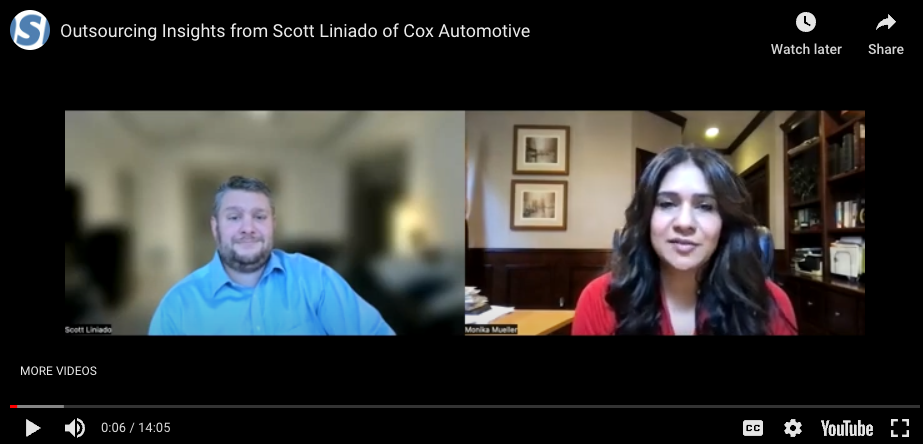Softensity Leadership Series: A conversation with Scott Liniado, VP, Product & Engineering, Manheim Client Solution Delivery at Cox Automotive.
By Softensity
For our latest Leadership Series interview, Softensity’s Monika Mueller sat down with Scott Liniado, Vice President of Product and Engineering at Cox Automotive, to discuss the organization’s outsourcing journey.
Scott is responsible for Mannheim’s enterprise software solution for large commercial clients. As North America’s leading provider of vehicle remarketing services, Manheim also boasts the world’s largest used vehicle marketplace. Based in Atlanta, Scott works to build the right technology for Manheim’s digital product portfolio while delivering an exceptional experience to Cox Automotive’s clients.
Read some highlights from Monika’s conversation with Scott below, or watch the full 14-minute interview for best practices, challenges and words of advice about outsourcing.
Why did Cox Automotive make a push into outsourcing a few years ago?
The biggest factor for us is the ability to flex up and flex down the workforce, and have access to a globally diverse set of talent. I think a lot of folks get a little nervous when you look at outsourcing, but I see it more as partners around the globe that can help you staff up using the diverse talent that’s out there.
You have very big universities all over the world that are pumping out great engineering talent, so not using them would be a real shame. We like to keep our core base of knowledge, and then augment it as we have projects go up and down over time. And it’s worked well for us.
How did you decide the functions that should be outsourced versus kept in house?
You want your core projects kept in house, but you don’t need to say — this isn’t for outsourcing, or this is. I think of it more as an execution partner. While things like a “keep the lights on,” or a “run-only” project suit themselves well because there’s not a lot of back and forth interaction, you can have success all the way up to highly innovative projects, too. You just have to have that trust and connection with the offshore team.
In a nutshell, things that are very well defined are going to work best. But if you don’t have the right talent to properly document and convey the business knowledge, you’re going to have a much harder time executing with a global team.
What steps did Cox Automotive take to prepare for a successful outsourcing model?
We really tried to consolidate through Covid, when we went from over 100 vendors down to a couple. In doing so, we had to build some centers of excellence across a few strategic vendors — and really train up the talent on our business domain and knowledge. You need to have that documentation, you need to have the subject matter experts working with the offshore team making sure that they really know what you’re building.
And you need to build the relationships to ensure that there’s a trust, even though someone is a world away, so they’ll ask you the right questions. And you know that they’ll get it done, and they know that you’ll help them out. If it’s a transaction thing where you’re sending cards over the fence every night, it’s not going to work as well.
How did you accomplish that through Covid, with limited ability to interact in person?
We really embraced Microsoft teams. Also making sure that the partners were holding our hands through the process. Not everyone was an expert in doing outsourcing, so it was helpful to do that, too. Having a consolidated vendor set really helped, because if you’re looking to do this with a lot of different vendors, and people just randomly coming in, it will be very difficult.
I think we got really lucky with the folks that we were working with. And it was a smooth onboarding process as we ramped up some teams. But overall, the piece that we missed I think is still essential, which is the travel, and bringing people back and forth. We had some relocate to the US to help lead teams and bridge the time zones. But just recently I was able to travel to see some of the teams for the first time since Covid, and it makes a heck of a difference. I love that we can work virtually, but you don’t get that trust and that speed of execution without really knowing someone.
What are some of the criteria that you look for in an outsourcing partner?
There are some entry points — you can say, do you have the bench strength? Do you have the recruiting abilities? But also, can you retain the talent? And how are you getting that talent in the door? Are you going out to the market and picking off people using a really good recruiting team, which some folks can do and execute well?
